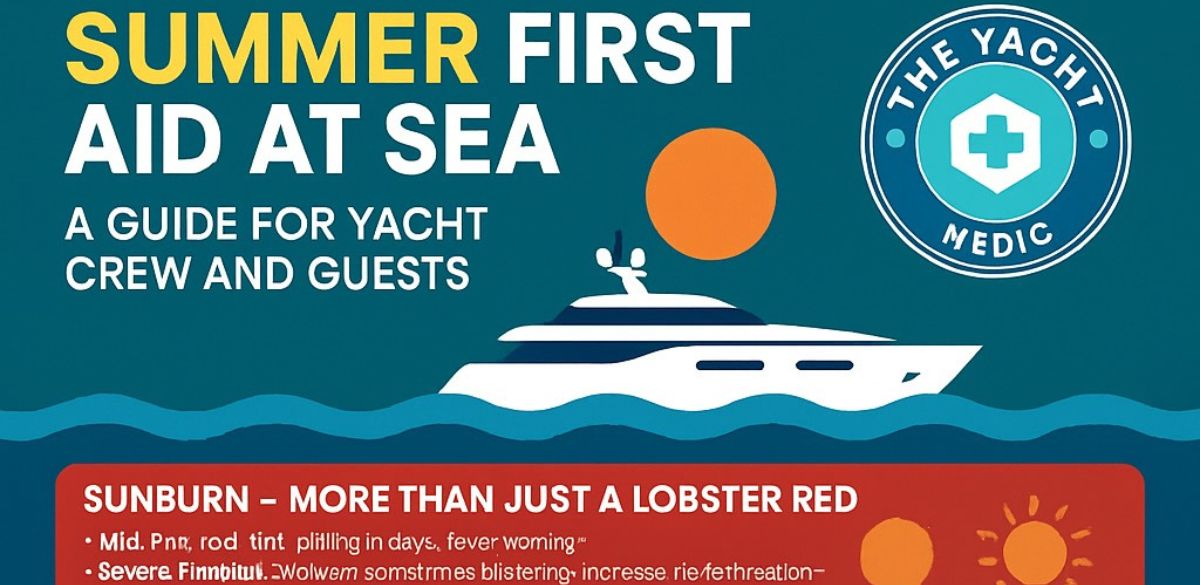Yacht medical emergencies in the Mediterranean | Crew first aid guide
Summer in the Mediterranean brings sun, salt, and unforgettable adventures at sea. But it also brings medical risks that crew and guests need to be prepared for. From sunburn that’s more than just a glow, to marine stings, heat emergencies, dehydration, and even intoxication, here’s your essential guide to keeping safe and thriving onboard.
Sunburn — more than just a lobster red
Step ashore in Magaluf in August and you’ll see them: bright-red tourists glowing like emergency flares. It’s a running joke — until you realise that sunburn is a radiation burn. Yacht medical emergencies in the Mediterranean are more common than you’d think, and sunburns can be one of the culprits.
- Mild: Pink-red, tight, peeling in days.
- Moderate: Painful, swollen, sometimes blistering.
- Severe: Blisters, fever, nausea, dehydration. This is a medical burn injury.
When to escalate: covering more than 10% of the body’s surface, fever, vomiting, confusion, or children/elderly affected.
First aid:
- Cool with tepid water (15–20°C) for 20 minutes within 3 hours — never ice.
- Hydrogel dressings (e.g. BurnAid) are more effective than aloe vera.
- Ibuprofen helps inflammation (avoid ulcers/asthma); paracetamol helps pain.
- Hydrate with electrolytes.
Alcohol and sunburn: Alcohol worsens dehydration, slows healing, and increases heatstroke risk.
Heat exhaustion & heatstroke
On yachts, crew often work long hours in blazing heat with minimal shade.
- Heat exhaustion: Sweating, dizziness, nausea, fast pulse.
- Heatstroke: Core temperature >40°C, hot dry skin, confusion, seizures, collapse. This is life-threatening.
First aid:
- Move to shade/AC, loosen clothing.
- Cool rapidly with tepid water, fans, ice packs to groin/neck/armpits.
- Oral rehydration if alert; IV fluids if severe.
- Always escalate suspected heatstroke.
Marine stings & puncture wounds
From jellyfish to weever fish, the Med is not without hazards.
Jellyfish (Pelagia noctiluca, “mauve stinger”):
- Rinse with seawater, never fresh water (causes nematocyst discharge).
- Immerse in hot water (~45°C) or apply heat packs for pain.
- Vinegar helps some species, but not Pelagia.
Weever/Scorpionfish:
- Extremely painful puncture wounds.
- Immerse in hot water 40–45°C for 30–90 min — denatures venom proteins.
- Analgesia may be required.
Infection risk: Any marine wound can harbour Vibrio or Mycobacterium. Early antibiotics may be lifesaving.
Drowning & shallow water blackout
Drowning is silent — victims don’t wave or call for help. The crew must act fast.
- Remove from water, check responsiveness and breathing.
- If not breathing: 5 rescue breaths first, then 30:2 compressions/breaths.
- Use oxygen if available.
- Evacuate all near-drowning cases; pulmonary oedema and ARDS may develop hours later.
Shallow water blackout: occurs after hyperventilation before diving. Oxygen levels plummet, causing loss of consciousness without warning.
- Prevention: Never hyperventilate before a dive; always dive with a buddy.
Tick bites & Mediterranean Lyme disease
Ticks thrive in pine forests and rural anchorages.
Tick removal:
- Use fine tweezers, pull straight up.
- Disinfect. Save ticks if possible.
- Never twist, burn, or smother with oil.
Lyme disease: not always a bullseye rash. Watch for fatigue, joint pain, neurological symptoms weeks later.
Prevention: clothing, DEET or picaridin repellents, or natural citriodiol-based sprays.
Mould & respiratory risks onboard
Hidden damp areas under headliners and mattresses can harbour Aspergillus and other moulds. Inhaling spores causes cough, fatigue, chest tightness, even pneumonia-like illness.
First aid & management:
- Remove source of exposure.
- Seek medical care if symptoms persist.
- HEPA filters and dehumidifiers help prevention.
Alcohol & drug intoxication — when it’s poisoning
Rosé on deck feels like summer, but alcohol and drugs are among the most common onboard medical emergencies.
Alcohol poisoning signs:
- Confusion or unresponsiveness
- Vomiting while unconscious
- Slow, irregular breathing
- Seizures, hypothermia, clammy skin
This is not a hangover — it is poisoning.
First aid:
- Call telemedicine or emergency services immediately.
- Keep the airway clear; recovery position if semi-conscious.
- Never induce vomiting.
- Maintain hydration if alert.
- Prepare for evacuation.
Drugs & interactions: sedatives, opioids, stimulants, or mixing alcohol with meds can cause collapse, arrhythmias, or respiratory depression.
Crew takeaway: If a guest is unconscious after drinking, treat it as poisoning and escalate. Delay costs lives.
Conclusion
Yachting in summer brings joy, but also medical challenges unique to the sea. Crew who know how to manage sunburn, heat illness, marine stings, drowning, ticks, mould, and intoxication can protect both guests and themselves. Preparation, prevention, and evidence-based first aid make the difference between a memorable holiday and a medical evacuation.
























0 Comments